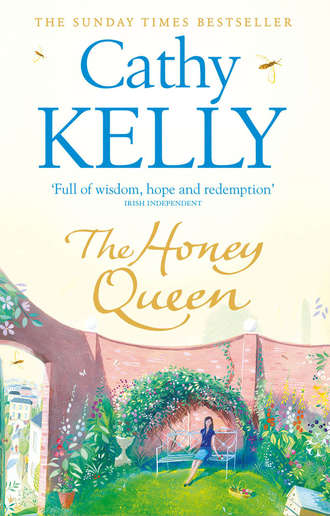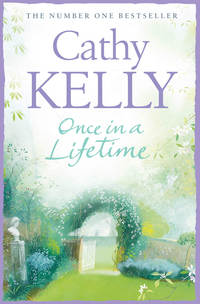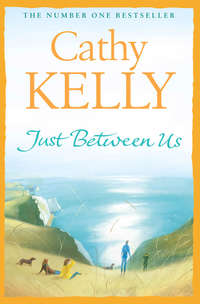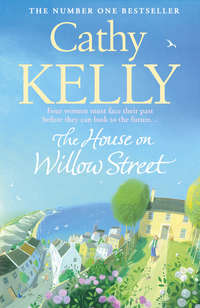
Полная версия
The Honey Queen
‘You get toned blokes in yoga classes and I get knee injections in the surgery,’ Doris would say in mock outrage. And Viletta would smile at the notion. She hadn’t looked at a man since her husband had died more than fifteen years earlier, for all her talk of cougars.
Lillie liked to amuse herself considering how the three of them must appear to strangers on their rambles: Viletta would appear to be the trainer, a lean, tanned woman urging her two more curvy friends on.
Though she didn’t have Viletta’s toned muscles, she didn’t look like a woman in her mid-sixties. That was most likely down to the hair, she reckoned: even a few greys in her thick strawberry blonde curls couldn’t diminish its warmth. Her Irish inheritance coming through. In the mirror she saw her face had become thinner since Sam’s death and underneath her iris-blue eyes were faint violet shadows. She hadn’t used make-up to hide them: vanity seemed so futile in the wake of her loss.
They were halfway into the walk and had settled into their regular rhythm when Doris managed to get herself beside Lillie, a few paces behind Viletta, who was storming ahead as usual.
‘You look a bit down, Lillie,’ she said conversationally. ‘Everything OK?’
Doris had known Lillie long enough to realize the effort required to maintain a smile on her face, a smile that would disintegrate the moment somebody put on their Poor dear, lost her husband voice or showed pity. Which was why Doris talked to her friend the way she’d always talked to her, in the same warm, vibrant tones.
‘I’ve been thinking about my brother in Ireland …’ began Lillie.
Beside her, she could sense Doris relax.
‘I’m going to Ireland to visit him and to find out about my birth mother,’ she said. There, it was done: she’d decided.
When Doris grabbed her and hugged her tightly, Lillie was so surprised she almost lost her balance.
‘I’m so glad!’ shrieked Doris, never one for volume control. ‘It’s exactly what you need. Oh, honey, I’m so glad!’
Lillie relaxed into her friend’s embrace. It felt lovely to be held. There were fewer people to do that these days. Her sons weren’t huggers, not the way Sam had been. Her hugs now came from her grandchildren. From Martin’s daughter, Dyanne, and from Shane, Evan’s seven-year-old, who held her tight and told her she was the best nanny in the world.
‘If I’d known you wanted to be rid of me that much, I’d have gone ages ago,’ she teased Doris when they separated.
‘Witch!’ said Doris, wiping her eyes. ‘I’m happy for you, Lillie. There’s no secret recipe for getting through what you’re getting through, but doing something different might add another ingredient to the pot, so to speak.’
Lillie nodded. ‘I’ve been thinking it over and over. Sam and I had talked about visiting Ireland, but I don’t think I’d ever have done it by myself at my age. But now Martin’s so excited about finding Seth and Dyanne’s desperately hoping the Irish relatives are rich so she can stay with them when she goes off on her big trip.’
Both women smiled. Dyanne was the same age as Doris’s grandson, Lloyd. Many amused conversations were had about their grandchildren, who were both going through an ‘I want to be famous’ phase, when they weren’t too preoccupied with ‘Can I have an advance on my pocket money?’
‘Are you stopping for a rest?’ Viletta called back to them.
‘No,’ yelled Doris, and they started walking again. ‘It’s going to be tough, Lillie, you realize that? You’ll be alone on a very emotional trip.’
Lillie nodded. She could rely on Doris for utter honesty.
‘I’m going to be fine,’ she said, and gave her friend a smile.
For the first time since Sam died, Doris caught a glimpse of peace in her friend’s iris-blue eyes.
‘Sam will be with me,’ Lillie added, touching one hand to her chest above her heart. Then her lips quirked in a smile like the Lillie of old. ‘I’m ordering him to come!’
Chapter One
Frankie Green woke bathed in cold sweat. The bedroom was dark and she felt so disorientated that for a moment she almost didn’t know where she was.
Her phone lay on her bedside table and she fumbled for it, pressing the button so that the screen lit up. With light, she managed to find her glasses and look at the time.
Two fifteen.
Oh hell, she thought. She had a hectic day ahead, she hadn’t been able to get to sleep for ages and now she was awake again.
Beside her, Seth was a long mound under the duvet, sleeping soundly, which was infinitely annoying. He didn’t have to get up in the morning.
Which wasn’t his fault, she reminded herself, as she did so often these days as a sort of guilty afterthought. He hadn’t joyfully decided to retire and let her continue working, he’d been made redundant three months ago and hated it. Yet, it felt like his fault that he could sleep late while she – now the major earner – had to haul herself out of bed come rain or shine.
Pushing back the duvet, she went into the horrible, poky bathroom she swore she would never get used to, shivering as the cool night air hit her soaked cotton pyjamas.
In the bathroom’s cold light, a tired, white-faced woman stared back at her from the mirror: dark hair plastered to her skull, face sheeny with damp, nightclothes sticking like a second skin.
She looked as if she’d been running through a rainforest for days. She looked – Frankie realized the correct word with misery – old.
Somehow, while she’d been busy trying to raise two children, run the Human Resources department of Dutton Insurance and be a wife to Seth Green, age had crept up on her. She’d been so busy working, doing school runs and making vast meals to freeze, checking homework diaries and worrying about exam results, mopping up teenage tears and making rare date nights with her husband, that the blur of her thirties had morphed into her forties and suddenly, here she was, forty-nine. Calcium, collagen, oestrogen – everything was leaching out of her. Soon all that would remain would be a dried-out husk and if she stood still long enough, she’d be stuffed in a museum as an example of tinder-dry womankind. Even her marriage felt dried out and empty. That was the worst thing and she couldn’t bear to think about it.
Is this all normal? she silently asked the mirror-image Frankie. If it was, nobody talked about it. Not her sister, not her friends. If only her mother was a bit normal, she might have asked her, but there was nothing normal about Madeleine. Her mother, pushing eighty and still fond of causing havoc, managed to be old in years without being old in any other way. Madeleine to most people, but plain old Mad to her two daughters, had never bothered with creams or unguents. In her forties, she’d lain in the back garden toasting herself under layers of coconut sun oil, happiest when she was nut brown. When hot pants were the ‘in’ clothes for teenagers, Madeleine had worn them herself, not caring that other mothers wore normal summer skirts and cardigans. If she passed a building site and somebody whistled, Madeleine would blow the builders a delighted kiss, while her teenage daughters, Frankie and Gabriella, would exchange horrified glances.
Why couldn’t Mother be more like other mothers?
As Frankie grew up, she began to appreciate her mother’s unconventional spirit but even so, she wondered at the secret of her parents’ long marriage. Eventually, Frankie decided that it worked because Dad was a placid person who managed by saying ‘that’s fine, dear,’ to whatever Madeleine wanted to do.
They still lived in a cottage in the fishing village of Kinsale, and when Madeleine went through her phase of ‘forgetting’ her costume when she went for her morning dip, Dad greeted people’s outraged comments by saying ‘Isn’t she a great woman for the swimming, all the same.’
Madeleine’s marriage guidance advice, if she offered it, would be to get married to a calm man in the first place, and then ignore him happily thereafter. Dad never seemed to get sad or tired. He was just Dad, content with his paper and the crossword, able to keep his spirits up no matter what happened, happy to let his wife be exactly who she wanted to be.
Beauty-wise, the sun had taken a cruel revenge on Frankie’s mother and now her face was more wrinkled than a very old crab apple. But in true Madeleine fashion, she didn’t mind in the slightest. She continued to wear bright-red lipstick and dye her grey hair a glossy dark brown and had no problem facing herself in the mirror.
Frankie’s mother was one of the happy people who liked what they saw when they spied their own reflection.
At Sunday lunches in Frankie and Seth’s house, Madeleine would happily discuss the way her hair was still silky and obedient, and say: ‘Frankie, I was thinking of getting a more angular bob in the hairdressers. Lionel says I’ve got the bones for it.’
Lionel was Madeleine’s hairdresser and, as far as Frankie was concerned, he clearly liked living on the edge, sending his older clientele out with styles their daughters wouldn’t dream of risking.
But maybe Lionel and his clients were right, Frankie thought gloomily. They didn’t worry about wrinkles – what was the point?
Frankie had been careful with the sun. She used serums and suncream. She read articles in magazines about the latest products, she never ventured out with anything less than a factor 25 moisturizer. And look at her now. She might write to all those serum and suncream people and tell them they should be fined for filling people’s heads with insane dreams. In the cold light of the basement bathroom, with bluish shadows under her dark eyes and a spiderweb of lines around them, she could have passed for eighty herself.
Maybe it was time she started visiting Lionel – the sort of deranged, angular haircut that Lady Gaga would baulk at might be the very thing. At least it would take people’s eyes away from her face.
Turning from the mirror, she stripped off her damp pyjamas and balled them up into the laundry basket. She dried off her hair and body, then, still using her phone for light because she didn’t want to wake Seth, found fresh nightclothes.
By the bed, she had lavender oil and she rubbed a bit on her wrists and temples. Nobody looked good when they woke in the middle of the night, she told herself, but at least she could smell good.
She was tired, that was all. But instead of going back to sleep, her mind began to race the way it so often did. The previous day at Dutton Insurance unfurled like a film reel, and she thought of all the things she ought to have done. Next, the following day’s meetings and potential problems began to roll out. The company employed nearly a thousand people, so as human resources director there was always something for Frankie to worry about.
Tomorrow – or rather today – she had to conduct five interviews for the position of deputy marketing director. Then there was a particularly tricky case of sexual harassment involving a woman in the motor insurance department and her boss. The claims department was in uproar over holiday policy, and the intervention of one of Frankie’s HR team had only succeeded in making matters worse, so that needed sorting out. And on top of that, one of the department heads wanted to take her to lunch to ‘pick her brains’ about something.
‘Lunch!’ she’d vented to Seth the previous evening as they sat at the kitchen table after dinner. Seth had cooked a very nice Thai curry and Frankie had eaten so much she’d had to open the button on her jeans. ‘I don’t have time for lunch! I’m supposed to run a team that isn’t actually big enough for the size of the company, recruit fabulous staff at high speed when required, and be free for lunch whenever some other executive wants to chat!’
‘You used to enjoy having lunches with the other executives,’ Seth said innocently.
‘That was when I had time for lunch. These days I barely have time to snatch a sandwich at my desk,’ she hissed. Did he understand anything?
‘There’s no need to snap,’ he said, with a hint of a snap in his own voice.
And of course, Frankie felt sorry for taking it out on him. But at the same time, she was angry. It seemed that she spent her life tiptoeing around male egos, both in the office and at home. Trying to allay other people’s worries when she was overwhelmed with her own. Sometimes Frankie felt it like an actual weight on her shoulders: worries about staff redundancies, about how pale and withdrawn Seth was, about how they were ever going to find the money to sort out the house.
The house. That was their biggest worry of all.
A dream Edwardian red-brick house with a large garden, Sorrento House has many unusual features the piece in the newspaper had purred. It had leapt out at them from the property supplement because Seth and Frankie had been talking about moving for years. They’d started married life in a narrow end-of-terrace house from the turn of the nineteenth century. When Emer and Alexei came along, they remodelled the place so that the front retained the period features, while the back was modern with a glass extension that Seth had designed, giving them a light-filled kitchen-cum-family room.
Much as they had loved that house, it was small. For years Frankie and Seth had talked about buying a big old house they could do up.
‘When Emer and Alexei are older,’ Frankie would say, during the mad junior school years when long division sums, homework and careful nurturing of delicate young souls took up every hour she wasn’t in the office.
‘When they’re settled, not an exam year,’ Seth would say when Emer and Alexei were teenagers, caught up in another phase of life where careful nurturing was required.
Then the previous July twenty-two-year-old Emer had finished college and decided to spend a year travelling the world. Inspired by his sister’s example, Alexei, just eighteen, had set off on a gap year with three school friends.
Looking back, Frankie could see that the whole moving house thing had come about as a coping mechanism for empty-nest syndrome.
She hadn’t wanted to stop being busy for long enough to think about her children leaving.
‘What if we moved house while you were away?’ she’d asked them. It had been June, and the four of them were sitting around the table in the light-filled kitchen, making the most of the last few weeks before her beloved children departed on their travels.
‘Go for it!’ said Emer.
Emer was the wild child of the family. She might have inherited her paternal grandmother’s strawberry blonde hair and bright blue eyes, but her eagerness for fun and adventure owed more to Grandmother Madeleine, Frankie thought ruefully. Still, four years at college, finishing with a masters in business studies, appeared to have calmed her down. At least, Frankie hoped it had.
‘It’s your turn to do things now, Mum,’ said Alexei gently. Her darling, thoughtful boy; she felt like leaping up from the table to give him a hug. Four years younger than his sister, he was gentler and quieter. There had been no baby after Emer and finally Frankie and Seth had turned to adoption. Since the small Russian boy with the blond hair, fine bones and a lonely look in his misty grey eyes had come into her life, Frankie had never ceased wanting to protect him.
The idea of Alexei travelling the world made her heart physically hurt. She’d thought taking care of small children had been hard, but nothing could be harder than watching those same children grow up and leave the nest.
‘It’s just a wild thought,’ said Seth, ever sensible. ‘We’d probably be insane to move. The economy’s so bad.’
‘The property market’s not great,’ Frankie agreed. ‘We should have done it years ago; we missed the boat.’
And then, alone in their family home with what seemed like the actual family part gone, they read about Sorrento House and went to see it.
What had made them fall for the place? Frankie remembered that first visit. It had been September – always the start of the year for Frankie, with its associations of back-to-school. The leaves on the trees were almost golden in the autumn light, and the beech tree with its bronzed leaves drooping outside the old stone pillars had given the house at the end of Maple Avenue a sort of faded glamour.
It brought to mind the endless leaves she’d gathered with the children for school projects, days spent trying to do leaf rubbings into copybooks, and the fun of decorating the house for Halloween, as Alexei and Emer eagerly discussed what costumes they’d wear that year.
If only they were here to see this, she thought sadly. But then she brightened up at the prospect of what a welcome home it would make, to arrive at this lovely house.
There was no doubt that the house was unusual. The porch and front door stood at a right angle to the façade, almost hidden behind great swathes of rhododendron that overran a garden at least three times the size of their old one.
The property agent was a man with a finely tuned sense of when not to speak, so he kept his thoughts to himself about the amount of work that needed doing. He’d learned the hard way not to say anything along the lines of ‘it needs updating’ because such words could prove fatal where potential buyers were concerned. Some people loved a challenge and were dying to get their hands on an industrial sander. Others thought you needed a hard hat and a guide to navigate the hardware shop.
So Seth and Frankie wandered around Sorrento House by themselves, seeing only the possibilities. The name itself called to them. Sorrento was where they’d gone on honeymoon.
The house, two storeys above a dark basement flat, had not been a single residence for years. The upstairs bedsits were miserably decorated in wallpapers at least thirty years old. On the ground floor, two of the bigger rooms, which Seth and Frankie could imagine transformed into gracious living rooms overlooking the garden, were divided in half with cheap plasterboard.
‘You’d think a person would be ashamed to put anyone in these rackety spaces,’ Frankie said in disgust, not even wanting to touch the filthy curtains half hanging on the windows.
Seth put an arm round her waist and steered her to face the long-neglected garden at the back.
‘Look,’ he said. ‘Then close your eyes and imagine how it will all appear when we’re finished with it. A gorgeous kitchen, a bit like at home, but extended out into that long garden. Don’t you love those copper beeches and the apple trees? And see that maple in the far left corner? It’s changing colour – in a week or so it’ll be a glorious crimson.’
Frankie sighed. ‘If I close my eyes, I’ll realize we’re mad to even consider buying the place. We’ll have to get it checked for damp, then rip off all that wallpaper, tear up those hideous nylon carpets, paint every inch inside and out, and … oh heck, the windows—’ She looked down in alarm. ‘Do you reckon this frame is rotten? Are the windows on borrowed time?’
‘I’ve been checking with my penknife while you were upstairs just now,’ he said. ‘The windows are actually fine. So’s the roof, as far as I can tell. Otherwise, we really would be mad to buy it. It would still be a lot of work interior-wise, and of course the extension would take time, but I can see how it will all come together. We just need to sit down and work out the numbers. Think, it will be our dream home, love. Sorrento House. That sounds a bit grand. We could change the name. Sorrento Villa is nicer, more homely, don’t you think?’
The words ‘dream home’ combined with the vision of glorious Italian coast magically mingled in Frankie’s mind. She’d been brought up in Kinsale, a jewel of a town perched beside the sea, and her sister, Gabrielle, had chosen to live in the seaside town of Cobh, about half an hour from Cork.
Another plus was the location: Redstone. It was a part of the city that had gone from fashionable in the nineteenth century, to down at heel in the twentieth, but was now growing in popularity again thanks to the regeneration of the area.
Seth had a development map which showed that their house faced others that backed on to the allotments behind rows of one-time council houses, the St Brigid’s estate. ‘Part of the waste ground beside the allotments is being turned into parkland,’ he explained, ‘which adds value to the neighbourhood.’
After seeing the house, they went for a coffee at the crossroads, which was the centre of Redstone. The place sealed the deal for both of them.
‘It’s perfect,’ said Frankie wistfully, admiring the sycamores growing at the roadside.
‘Very nineteen thirties,’ mused Seth as they walked along hand-in-hand, deciding which place to go into. ‘Look at those façades.’ He pointed to one block decorated with period signage.
They admired the clothes boutique, the delicatessen with windows full of cheeses and all manner of exotic meats, they walked past a pretty pink-and-brown beauty salon, and finally settled in a coffee shop where they ate the best raspberry-and-almond muffins they’d ever tasted.
‘We can do it,’ Seth said, enthusiastically outlining his plans.
He was sure, from experience, that planning permission wouldn’t be a problem. He would design the new parts of the house, a builder he’d worked with would agree a reasonable price for the work, and Seth could manage the build himself. With two decent salaries coming in, they should be able to find the money.
‘Can you cope with living in the basement while we do up the rest?’ Seth asked her the day before the sale closed. They were walking through the property again, imagining grand neo-classical fireplaces from the salvage yard instead of the bricked-up fireplaces and hazardous two-bar electric fires that the previous owner had installed everywhere.
‘I can cope with anything,’ Frankie had said excitedly, eyeing up the kitchen and imagining how marvellous it would look when the extension was built and the whole room had been turned into an open-plan kitchen/breakfast room. She’d got an idea for a conservatory, too. She could just see a couple of huge planters filled with exotic ferns beside the imaginary doors. And the garden. Gardening had never really been her thing, but here there was so much possibility. Or there would be, once the jungle of weeds and wild brambles had been torn away.
I can cope with anything. Famous last words for sure.
A month after they’d moved into the basement flat of the newly named Sorrento Villa, Seth was made redundant by the big architectural practice where he’d worked for fifteen years. The company was in dire financial straits, the senior partner explained: they had no option but to downsize.
Shocked, Frankie recalled that same senior partner – Seth’s friend since college – at the previous year’s Christmas dinner, where much had been made of the company’s resilience in the shaky economic climate. A glass of red wine in his hand, the man had toasted each member of staff. Frankie had clapped loudest of all when he’d said ‘Seth Green, the man we all aspire to be,’ then raising his glass, ‘quietly professional, dedicated and loyal.’
Loyalty hadn’t gone both ways it seemed. Seth wasn’t a full partner, but on a high wage, so his name was at the top of the redundancy list.
If she was shocked, then Seth had been devastated.
‘I’ve failed you,’ was all he could say. Despite his years of hard work for the company he’d only been given the statutory legal pay-off. There was no vat of cash to help fund the work on Sorrento Villa. They had savings but it would be madness to plough them into such a project. ‘How will we manage financially?’ Seth asked in despair. ‘With the new house …’
‘We’ll manage,’ said Frankie, magically switching on the same positive tone that had worked so well during the children’s teenage years. ‘We’ll manage somehow.’
But inside, her stomach was churning with fear. How could they survive on only one salary? If only they’d stayed in their modest old house instead of thinking they were the sort of people who should own a detached Victorian red-brick villa on a half-acre site in Redstone. Christmas had been just over a month off, both children were staying away – Emer in Australia, Alexei in Japan – and she and Seth had to face a dark and depressing festive season on their own. Three months later, they were still far from managing.








